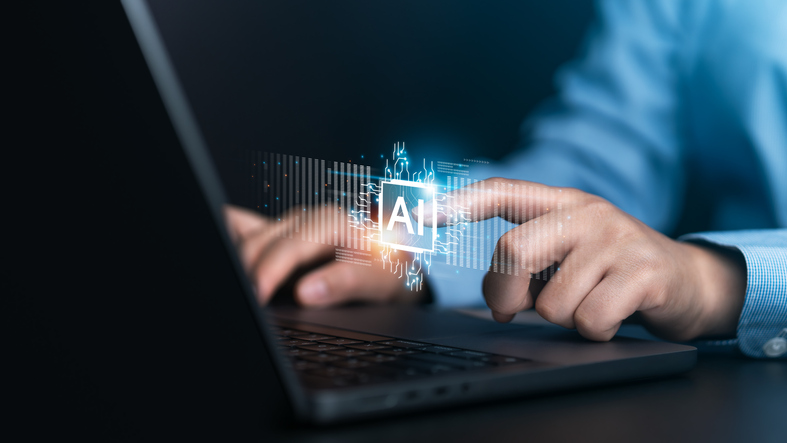Artificial Intelligence (AI) is making its mark on nearly every industry, including food manufacturing. In the face of changing consumer demands and complex supply chains, food manufacturers are looking to AI for ways to solve today’s challenges.
Across all areas of the industry, from the factory floor to distribution, AI technology is driving smarter decision-making, reducing waste and keeping food safe. This blog post looks at the top ten AI applications in food manufacturing and how they’re changing the industry.

Digital Transformation for Food Manufacturing
Download this guide to discover how integrating technologies like IoT, AI, and automation can revolutionize your operations.
How AI is Used in Food Manufacturing
AI-Powered Quality Control
Traditional quality control performed by human inspectors can be time-consuming and error-prone. AI-Powered computer vision systems can detect defects, inconsistencies or foreign materials in real-time. Computer vision systems use cameras and digital images and machine learning to recognize discrepancies.
Use Cases:
- Detecting bruises or discoloration on fruits and vegetables
- Identifying undercooked or overcooked products
- Spotting packaging defects like torn seals or missing labels
These systems can operate around the clock, improve accuracy rates, and help manufacturers catch problems before they leave the factory.
Predictive Maintenance and Equipment Monitoring
Even minor equipment breakdowns can lead to major consequences like costly delays or even product losses. AI used in predictive maintenance systems helps prevent this by analyzing sensor data to detect early signs of wear and tear. Predicting equipment failures before they occur minimizes downtime.
Benefits:
- Reduce unplanned downtime
- Extend the life of equipment
AI doesn’t just fix problems; it prevents them, helping facilities run smoothly.

End-to-End Traceability
Between changing industry regulations and costly food recalls, traceability is vital in food manufacturing. Companies must ensure they have audit trails in place, along with end-to-end visibility into their supply chain and product distribution. AI enhances traceability by connecting and analyzing data from every stage, from farm to factory to shelf.
Using technologies like machine learning, IoT sensors, and blockchain, AI can:
- Track the origin and journey of ingredients
- Monitor storage conditions like temperature and humidity
- Instantly trace affected batches during recalls
- AI-powered sensors to track environmental conditions in production areas
- Computer vision to detect mold, discoloration, or unexpected substances
This kind of traceability not only improves food safety but also builds consumer trust through transparency.
Smart Forecasting for Demand and Inventory
AI also plays a role in helping food manufacturers predict demand and manage their inventory. Traditional methods examine historical data to form predictions, using statistical models. But problems arise when the models assume past trends will continue, or don’t take into account economic indicators or unforeseen events.
Artificial intelligence, particularly machine learning, can analyze large amounts of historical data, while also taking external factors into account.
AI forecasting models can:
- Analyze historical sales, market trends, and seasonality
- Predict future demand with accuracy
- Adjust production planning and procurement in real-time
By aligning production more closely with demand, companies can avoid overproduction and reduce surplus inventory that might otherwise go to waste.
Supply Chain Adaptability and Regulation Compliance
With uncertainty surrounding tariffs, industry regulations and supply chain disruptions, increasing agility through AI-powered systems allows companies to adapt on-the-fly. AI can provide insights into which raw ingredients may be affected by supply chain issues, or bring awareness to regulation changes, allowing employees to focus on other tasks and prepare for disruptions.
Benefits:
- Reduced disruption impact
- Improved compliance accuracy
- Increased operational efficiency
These tools help companies stay ahead of the curve, even in the face of changes in the marketplace.
Adoption of AI in business has doubled since 2017, according to a McKinsey Global Survey, with 50% to 60% of organizations reporting using it during the past few years.
Food Business News
Recipe Optimization and Product Development
The influence of AI extends beyond operations. It’s also helping R&D teams create innovative new products, and faster than ever before. By analyzing social media and customer feedback, AI can predict emerging trends.
Using machine learning models, teams can:
- Increase product success rates by aligning formulations with consumer preferences
- Accelerate product development cycles by reducing trial-and-error and time-to-market.
- Reduce costs through more efficient use of ingredients and fewer failed product trials.
As a result, companies can create smarter, market-ready products with greater speed and confidence.
Robotics and Smart Automation
While robotics have been used in the food manufacturing industry for decades, AI is taking this automation to a new level. The rise of collaborative robots, or cobots, work alongside humans and leverage AI to handle more tasks than traditional machines.
Applications include:
- Picking and placing irregularly shaped items (like bakery goods)
- Automating packaging and labeling with greater precision
- Coordinating with vision systems for quality checks
By utilizing AI enabled automation, manufacturers can make their operations smarter, more flexible, and better equipped to handle real-world challenges.
Ready to start your digital transformation journey?
Customized Nutrition
Increasingly, people want food that works for them, based on their individual needs, lifestyle and preferences. AI helps manufacturers tailor their products to specific consumer needs.
With AI, companies can:
- Analyze consumer preferences and dietary restrictions
- Suggest personalized product variants (e.g., gluten-free, low-sodium)
- Power recommendation engines for direct-to-consumer platforms
By analyzing health data and real-time consumer feedback, AI makes it possible to deliver personalized nutrition at scale, meeting demand while also building brand loyalty.
Sustainability and Waste Reduction
Waste reduction isn’t just a buzzword; it has real implications for manufacturers’ bottom line. A recent FoodDive article explains, “manufacturers’ opportunities to reduce food waste can drive profits, boost shareholders’ confidence, and bolster commitments to transparency and sustainability in the eyes of consumers.”
When aided by AI, manufacturers can improve efforts to reduce their environmental impact by minimizing waste, conserving resources, and improving efficiency.
How AI supports sustainability:
- Optimizing water and energy usage in processing
- Predicting spoilage and reducing food loss
- Streamlining supply chains to lower carbon footprints
By using AI to track and optimize resource usage, manufacturers can make better decisions for both the planet and their bottom line.
Enhanced Decision-Making Through Data Insights
Does it ever feel like you’re drowning in data? If so, you’re not alone. Food manufacturers generate massive amounts of data, including production metrics, quality measurements and customer feedback. AI helps turn this data into actionable insights.
With AI dashboards and analytics tools, managers can:
- Monitor KPIs in real time
- Identify bottlenecks or inefficiencies
- Make data-driven decisions for continuous improvement
By transforming raw data into clear reports, AI empowers teams to act faster and more confidently.
Conclusion: The Future of Food is Intelligent
What started as a trend is now well on its way to becoming a core technology. AI is poised to impact every aspect of food manufacturing, from streamlining supply chains to enhancing quality control and personalizing customer experiences. Whatever your business challenges may be, AI offers scalable, efficient and data-driven solutions.
Manufacturers that embrace AI today will be better prepared for tomorrow’s challenges— delivering safer, smarter, and more sustainable food from farm to fork. Want to explore how AI could improve your food manufacturing operation? Request a free consultation to discuss solutions tailored to your business.
Table of Contents
More ERP material...
Why Food Manufacturers Need Smart Factories
Discover why smart factories are essential for food and beverage manufacturers facing…
Top ERP Software Trends 2026: AI Capabilities to Watch
Learn why analyzing and improving processes upfront is critical to reducing risk,…
Why Do Business Process Analysis Before a New ERP System
Learn why analyzing and improving processes upfront is critical to reducing risk,…



